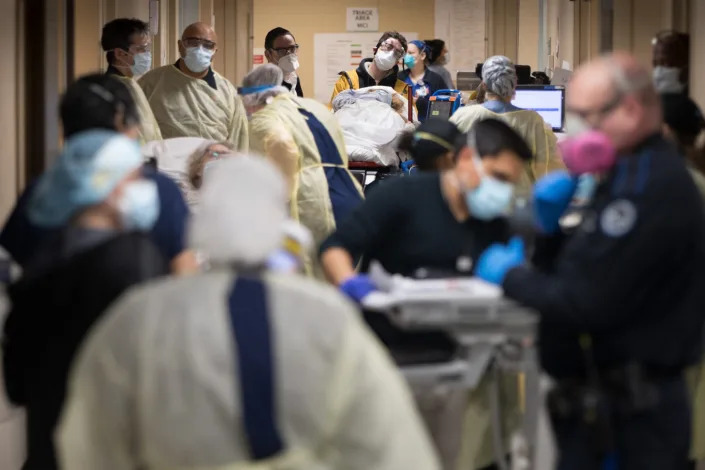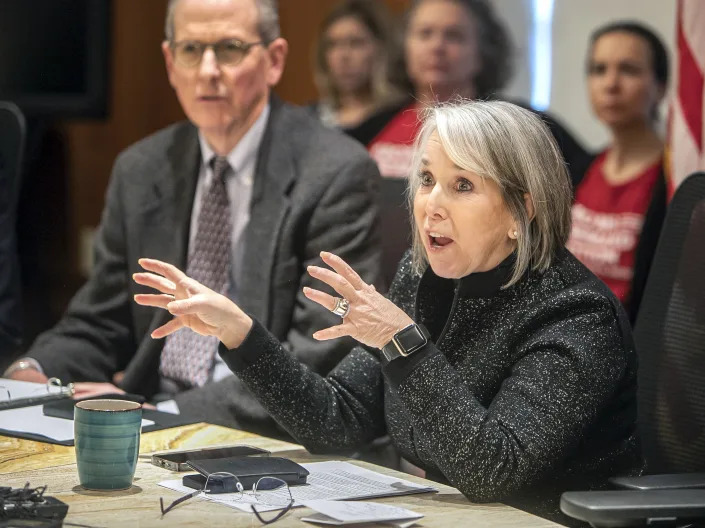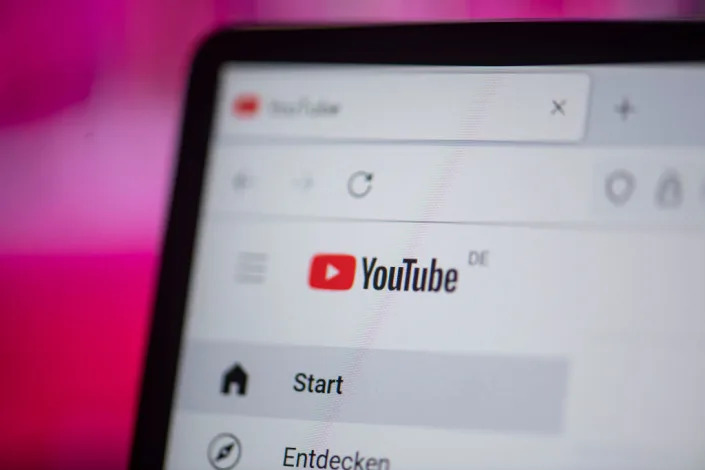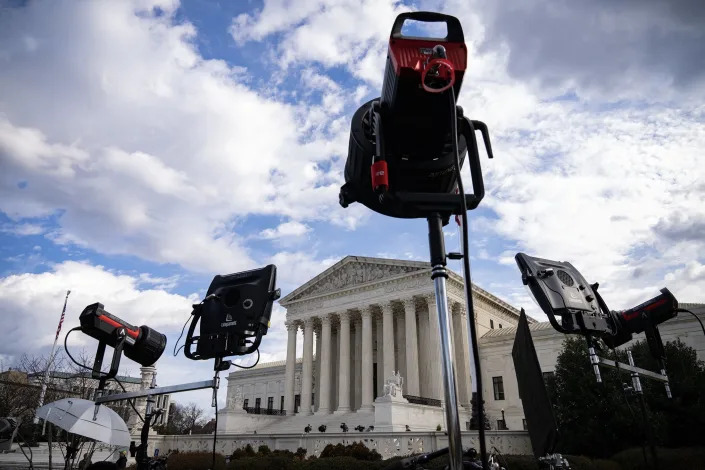THE ONION GOES TO COURT
The Supreme Court lets police officers avoid being sued after they arrested an Ohio man for making fun of cops on Facebook
Grace Eliza Goodwin,Ashley Collman
Tue, February 21, 2023

Stock photo.SimonSkafar/Getty Images
An Ohio man sued his local police department after they arrested him for mocking cops online.
The Supreme Court declined to take up his case, effectively allowing the police officers to avoid the lawsuit.
The Onion submitted a briefing defending Anthony Novak, who had created a Facebook page parodying police.
The Supreme Court has declined to take up the case of an Ohio man who said police officers violated his constitutional rights after they arrested him for making fun of the police department on Facebook.
Back in 2016, police arrested Anthony Novak for a satirical Facebook page he had created posing as his local police department in Parma, Ohio — his page had the same name, profile picture, and cover photo as the police department's official page, according to SCOTUSblog.
The posts on Novak's page, which was only live for 12 hours, mocked the police department. In one post, he announced a new hiring initiative "strongly encouraging minorities not to apply," according to SCOTUSblog.
Another post warned local residents not to offer food, shelter, or money to homeless people, NBC News reported.
The police department charged Novak under Ohio state law with disrupting police operations, and jailed him for four days, though he was later acquitted at trial, according to NBC News.
Novak then sued the department and the officers who arrested him, arguing that they violated his constitutional rights to free speech and freedom from unreasonable searches and seizures, according to SCOTUSblog.
The U.S. Court of Appeals for the 6th Circuit ruled that Novak couldn't sue the police because they had qualified immunity — a legal concept that protects police from facing civil lawsuits over their actions while in uniform.
Novak appealed that decision to the Supreme Court, even getting the satirical news site The Onion to write an amicus brief.
"The Sixth Circuit's ruling imperils an ancient form of discourse. The court's decision suggests that parodists are in the clear only if they pop the balloon in advance by warning their audience that their parody is not true," lawyers for The Onion wrote in the outlet's amicus brief. "But some forms of comedy don't work unless the comedian is able to tell the joke with a straight face. Parody is the quintessential example. Parodists intentionally inhabit the rhetorical form of their target in order to exaggerate or implode it—and by doing so demonstrate the target's illogic or absurdity."
But the Supreme Court on Tuesday decided not to take up Novak's case. The Supreme Court regularly takes on less than 1% of the case petitions it receives every year, according to News 5 Cleveland.
"The Supreme Court's decision not to consider Mr. Novak's plight reinforces a trend effectively blessing local government officials' abuses of the Constitution," one of Novak's attorneys, Subodh Chandra, said in a statement to Insider on Tuesday. "Now, in our region of the country at least, we must all think twice before we mock government officials because they can use the excuse that a handful of people are complaining to seize our possessions, jail us, and prosecute us. Officials can then deploy qualified immunity as a defense to any accountability, and federal courts won't even send a message to officials to not abuse rights in the future."
"We must abolish qualified immunity before we have no enforceable rights at all," Chandra added
Representatives for the Parma Police officers Novak sued and The Onion did not immediately return Insider's request for comment on the Supreme Court's decision not to hear the case on Tuesday.
Suing police officers is nearly impossible
The case highlights just how hard it is to sue police officers who violate the Constitution in the line of duty.
In 1961, the Supreme Court ruled that people can sue police officers who violate their constitutional rights, a decision which set off concerns that no one would want to be a police officer anymore and that departments would be rendered useless.
In 1967, the Supreme Court came up with the idea of "qualified immunity," which protects officers from being sued for violating the Constitution if they were acting in "good faith." That decision was further strengthened by the Supreme Court in 1982, when the court ruled that "good faith" was too much of a burden for officers to prove and that they should be given immunity so long as they didn't violate "clearly established law."
In recent years there has been an effort in the US to end qualified immunity protections for police officers. The George Floyd Justice in Police Act was passed by the House in 2020 and included a section restricting qualified immunity for police officers. But the bill failed in the Senate.
U.S. Supreme Court spurns challenge to Arkansas law against contractors boycotting Israel
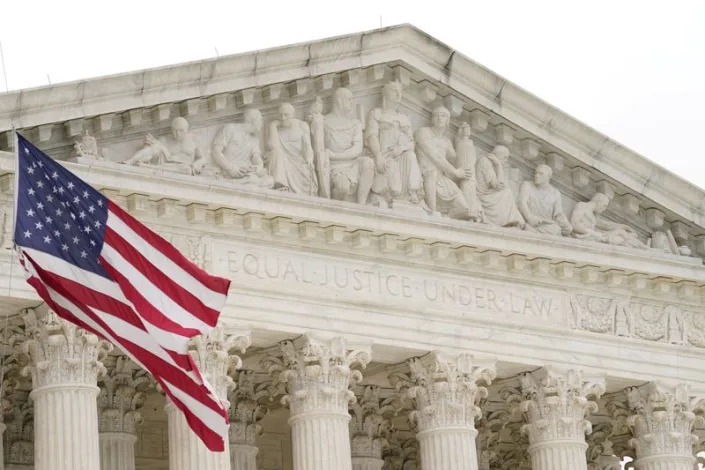
Andrew Chung
Tue, February 21, 2023
By Andrew Chung
WASHINGTON (Reuters) -The U.S. Supreme Court on Tuesday declined to revive a newspaper's challenge on free speech grounds to an Arkansas law requiring state government contractors to pledge not to boycott Israel, a policy the publication's lawyers called a threat to a constitutionally protected form of collective protest.
The justices turned away an appeal by the Arkansas Times, represented by the American Civil Liberties Union, of a lower court's ruling dismissing its lawsuit that claimed that the measure punishes participation in political boycotts based on the viewpoint expressed in violation of the U.S. Constitution's First Amendment guarantee of free speech.
The Arkansas law, passed in 2017, requires public contracts to include a certification that the contractor is not engaged in a "boycott" Israel, which includes "actions that are intended to limit commercial relations" with Israel or "Israeli-controlled territories." It applies to contracts worth at least $1,000.
More than half of U.S. states have similar laws barring contractors that refuse to do business with Israel, including as part of the international "boycott, divestment and sanctions" movement that seeks to pressure Israel economically over its treatment of the Palestinians including Jewish settlements in the occupied territories. Israel has called such boycotts discriminatory and anti-Semitic.
The Arkansas Times sued in 2018 after it was informed that in order to run advertisements for the University of Arkansas Pulaski Technical College, an institution with which it had advertising contracts for years, it would have to sign the certification.
The paper had not participated in a boycott against Israel but refused to sign because it said the measure required taking a political position in return for advertising.
A full slate of 10 judges on the St. Louis-based 8th U.S. Circuit Court of Appeals last year dismissed the challenge, upholding the law as one that does not violate the First Amendment because it affects only commercial conduct, not expression.
"It does not ban Arkansas Times from publicly criticizing Israel, or even protesting the statute itself. It only prohibits economic decisions that discriminate against Israel," the 8th Circuit concluded.
In its appeal to the Supreme Court, the ACLU argued that the state's actions were prohibited under an important 1982 Supreme Court free speech ruling called NAACP v. Claiborne Hardware Co. In that decision, the court decided that nonviolent boycott activity is constitutionally protected in a case involving a lawsuit by white-owned businesses in Mississippi to recover losses stemming from a 1966 racial-justice boycott.
The ACLU said boycotts are an "enduring part of the fabric of American public discourse," citing as examples 18th century Revolutionary War era boycotts of British goods, the Montgomery bus boycott challenging racial segregation in the 1950s and more recently boycotts of companies that support abortion provider Planned Parenthood and boycotts of companies that support the National Rifle Association gun rights lobby.
Allowing the Arkansas law to stand would strike a serious blow to American freedoms of expression and assembly by "empowering policymakers to suppress political boycotts that express disfavored messages," the ACLU said.
(Reporting by Andrew Chung; Editing by Will Dunham)
U.S. Supreme Court snubs Wikipedia bid to challenge NSA surveillance
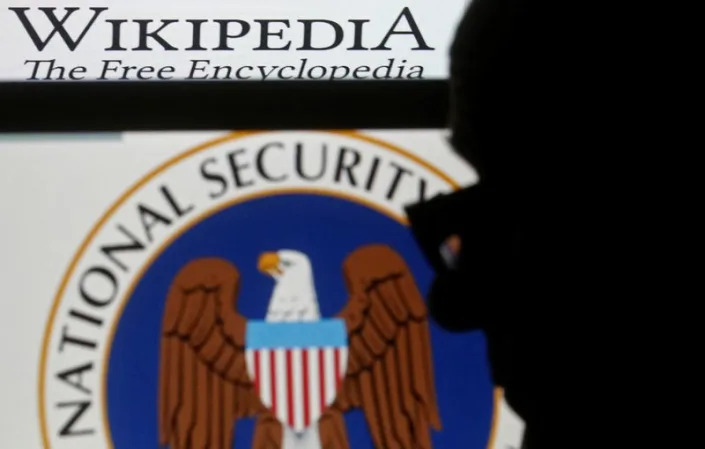
Tue, February 21, 2023 at 7:43 AM MST·2 min read
By Andrew Chung
WASHINGTON (Reuters) -The U.S. Supreme Court on Tuesday declined to hear a bid by the operator of the popular Wikipedia internet encyclopedia to resurrect its lawsuit against the National Security Agency challenging mass online surveillance.
Turning away the Wikimedia Foundation's appeal, the justices left in place a lower court's dismissal of the lawsuit based on the government's assertion of what is called the state secrets privilege, a legal doctrine that can shut down litigation if disclosure of certain information would damage U.S. national security.
Represented by the American Civil Liberties Union, Wikimedia Foundation sued in 2015 challenging the legality of the NSA's "Upstream" surveillance of foreign targets through the "suspicionless" collection and searching of internet traffic on data transmission lines flowing into and out of the United States.
The NSA, part of the Defense Department, is the agency responsible for U.S. cryptographic and communications intelligence and security. The U.S. government has said the NSA's surveillance targeting is authorized by a 2008 amendment to a federal law called the Foreign Intelligence Surveillance Act. Upstream's existence was revealed in 2013 leaks by former NSA contractor Edward Snowden, who later fled to Russia and has been granted Russian citizenship by President Vladimir Putin.
The lawsuit cast the "surveillance dragnet" as an unlawful invasion of Americans' privacy that violates the U.S. Constitution's First Amendment, which protects freedom of speech, and Fourth Amendment, which prohibits unreasonable searches and seizures. Wikimedia compared the interception by the NSA of its communications to the "seizing and searching the patron records of the largest library in the world."
The Richmond, Virginia-based 4th U.S. Circuit Court of Appeals in 2021 upheld a federal judge's dismissal of the case, concluding that the NSA properly invoked the states secrets privilege - meaning the litigation cannot proceed - because disclosing details about the surveillance could harm U.S. intelligence operations.
The ACLU's lawyers had urged the justices to hear the case, stating: "Although this mass surveillance of Americans' private communications raises grave constitutional questions, its lawfulness has yet to be considered by any ordinary court, civil or criminal, in the more than 20 years of its operation."
(Reporting by Andrew Chung; Editing by Will Dunham)


